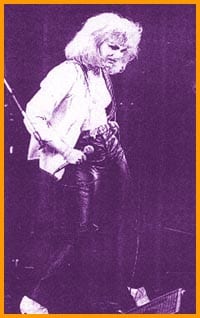Betcha dollars to donuts Shania Twain had something else in mind when she wrapped her mouth around the lyrics to “Man I Feel Like A Woman.” Something different, that is, when compared to the CD version Jayne County is releasing next month.
If you don’t believe me, download a sneak preview at jaynecounty.com or, better yet, grab your fishnets and head out to Vazaleen tomorrow night to catch the legendary, trans-gendered punk rock goddess in person!
(The name of the queer rock night at the El Mocambo changed from Vaseline to Vazaleen – at least temporarily – due to pressure from Unilever, which owns the Vaseline copyright.)
Still smokin’ from recent live shows in LA, Atlanta and Don Hill’s Squeezebox in New York, Jayne County delivers three decades of straight-up rock and low-brow talk to Toronto, for the first time in 20 years.
The legend of Jayne County began in Dallas, Georgia, as Roger Wayne; shifted into high gear in New York City during the Warhol ’70s as Wayne County; and achieved new meaning in this very city on New Year’s Eve 1979 – that’s when Wayne hit the stage as Jayne, at Toronto’s original punk rock haven, The Edge. Check her Rock ‘n’ Roll Resurrection album, recorded on that night.
County’s legendary status isn’t simple ’70s revivalism. No! Jayne County is one of the few original icons of punk rock stage and screen to keep the fires burning.
What began in the early ’70s as music journalism (Wayne’s loose reportage for Rock Scene magazine), turned into a cult phenomenon as Wayne County (and his Backstreet Boys – no guff!), hit the stages of New York’s scummiest punk clubs.
Carving a filthy little niche in the local scene for themselves, the band produced a gem-stone of vintage NYC raunch ‘n’ roll: the 7″ single of “Max’s Kansas City” (or “Thity,” as Wayne would have it).
The independent record reached an international underground as the punk rock revolution spiraled outward from cities like London, New York, LA and Toronto, gaining Wayne some nasty reputation to build on.
And build he did!
Following a starring role in Derek Jarman’s 1977 cinematic punk classic, Jubilee, Wayne County (now with the Electric Chairs) released five albums in 1978 to ’79. The self-titled Electric Chairs debut – also issued as Blatantly Offensive, which included alternate, more X-rated material – featured some of County’s most infamous songs: “Bad In Bed,” “Toilet Love” and “Fuck Off.”
But it was his final recording as Wayne that raised the musical stakes.
Released in 1979, Things Your Mother Never Told You merged Wayne’s mega-perv persona with a then-burgeoning electro-synth music scene. The stunning results include the futurist-electrash hits “Waiting For The Marines,” “Midnight Pal” and “Think Straight.”
Since her rock ‘n’ roll resurrection, Jayne has worked in film, video and stage and has enjoyed continued interest in her music, demonstrated by an ever-growing catalogue of re-issues and remixes.
Her autobiography, Man Enough To Be A Woman, published in 1995, quickly became a bedside favourite of the queer showbiz elite (see Boy George’s February 1996 interview in Boyz Magazine).
With original songs like “Texas Chainsaw Manicurist,” “When Queens Collide” and “Cream In My Jeans,” the Vazeleen gig ain’t gonna be no Bar 501 window show.
Jayne County, Live.
$7. 10pm doors.
Fri, Dec 29.
Vazaleen at the El Mocambo.
464 Spadina Ave.
(416) 968-2001.

 Why you can trust Xtra
Why you can trust Xtra


